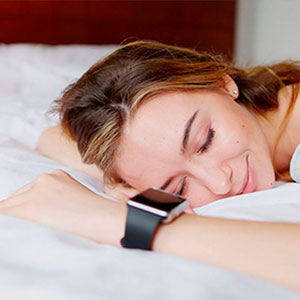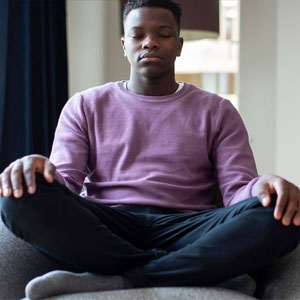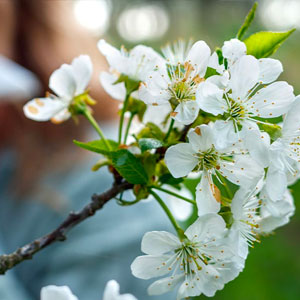How can I get better sleep?
Can't sleep? You're not alone - the National Institute for Health and Care Excellence (NICE) says that around one-third of adults experience sleep problems at least once a week. We asked the experts about the science behind getting a better kip.
Professor Guy Leschziner, professor of neurology and sleep medicine at Guy's Hospital Sleep Disorders Centre, and author of The Secret World of Sleep, says: 'It might sound counter-intuitive, but depriving yourself of sleep can enable your brain to re-establish a proper sleep schedule.'
Note down how much time you actually spend asleep on a typical night - as opposed to tossing and turning - then allow yourself to sleep for this amount of time plus 30 minutes.
For example, if you are trying to sleep for eight hours but only managing five, spend five hours and 30 minutes in bed - based on the time you want to get up and altering your bedtime accordingly - and gradually increase it once you're spending the majority of time in bed sleeping.
Professor Russell Foster, professor of circadian neuroscience at the University of Oxford, advises limiting daytime naps to 20 minutes up to six hours before bedtime or you could worsen your insomnia.
If you have a smartwatch or fitness tracker the sleep tracking function may help you understand aspects of your sleep, but Professor Leschziner suggests using them with caution as the information could be inaccurate and could even fuel your anxiety - causing further sleep issues.
Our body temperature drops by a couple of degrees when we are sleeping to help conserve energy for vital functions such as breathing.
If it's too cold (under about 12°C) it can be difficult to drop off, and if it's too hot (24°C or more) this can lead to a restless sleep.
We typically sleep better when the room is cooler - ideally around 16-18°C.
A 2012 study reported in the Journal of Physiological Anthropology found that room temperature is one of the most important factors when it comes to achieving a good quality sleep.
A fan, air conditioner or heater can help you to achieve a suitable bedroom temperature, but opening a window, or if it's cold piling on the blankets, can also help. Bed socks can also make a big difference if you're feeling chilly.
A 2021 Italian Journal of Trauma and Orthopedics literature review on sleep quality and back pain found that a medium-firm mattress helps with sleep quality, comfort and keeping the spine in the best position.
The type matters too. When we surveyed Which? members about mattresses, those who have an open coil mattress were less likely to say it helps them get a good night's sleep than those with other types of mattress.
Lie for around five to ten minutes on several mattresses when you're trying them out, remembering to try turning on them to see how comfortable this is, too.
If you sleep with a partner, bear in mind any differences in weight and size between you both, as this affects what type of mattress will suit you best.
Choosing the right pillow can help, too - for example, a memory foam pillow is a great option for those looking for neck pain relief, as it contours to your body. See our pillow buying guide for more tips on choosing.
If you're not sleeping properly, exposing yourself to at least 30 minutes of natural light in the morning can help reset your body clock so you'll sleep more easily at bedtime.
Daylight in direct sunlight has up to 10,000 lux (bright office lighting is generally less than 500 lux) which is why daylight is so powerful at helping to reset the sleep-wake cycle.
Conversely, blue light emitted by many devices including smartphones and laptops has been found in multiple studies to contribute to poor sleep and excessive daytime sleepiness.
Stop using screens an hour before bedtime, even if they are in night mode, to avoid overstimulating your brain and preventing good sleep.
A 2019 study published in the journal Sleep Medicine Reviews found that taking a warm bath or shower of 40-42.5 °C one to two hours before bedtime improved sleep quality and sleep efficiency (the time spent asleep when you're in bed), and reduced by an average of 10 minutes the amount of time it takes to drop off to sleep.
During the night our temperature drops and this aids better sleep, so although it sounds counter-intuitive, warming ourselves up by immersing ourselves in warm or hot water a little while before we go to bed actually helps to aid this natural drop.A 2019 study published in the journal Sleep Medicine Reviews found that taking a warm bath or shower of 40-42.5 °C one to two hours before bedtime improved sleep quality and sleep efficiency (the time spent asleep when you're in bed), and reduced by an average of 10 minutes the amount of time it takes to drop off to sleep.
The way it does this is by taking heat away from the body's core and to the hands and feet from where it is dispersed.
If sleep hygiene doesn't seem to be helping, online self-help apps offering cognitive behavioural therapy for insomnia (CBT-I) can be an effective insomnia solution - and in some cases even better than face-to-face therapy.
Research carried out in 2020 by the Oxford Academic Health Science Network found that Sleepio - a six-week digital treatment for insomnia - helped those with insomnia gain almost six hours more sleep a week, as well as reducing sleeping pill use, time off sick and the number of GP visits.
CBT-I helps you to identify thoughts and behaviours that are causing your sleep problems and replace them with more constructive ones to promote healthy sleep through better habits.
Ask your GP about CBT-I as you may be able to get Sleepio or Sleepstation for free on the NHS - both are accredited by NICE.
Lavender sprays, magnesium sprays and other herbal aids such as CBD oil may help by creating a ritual around sleep, but the evidence for their effectiveness is scanty, so you're better off getting your sleep habits in order as per the above first, before turning to extras such as supplements or sprays.
If you're still struggling, talk to your GP about other options and to rule out anything else that might be contributing to the issue.


